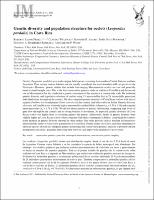Mostrar el registro sencillo del ítem
Genetic diversity and population structure for ocelots (Leopardus pardalis) in Costa Rica
| dc.contributor.author | Salom-Pérez, Roberto | |
| dc.contributor.author | Wultsch, Claudia | |
| dc.contributor.author | Adams, Jennifer R. | |
| dc.contributor.author | Soto-Fournier, Sofía | |
| dc.contributor.author | Gutiérrez-Espeleta, Gustavo A. | |
| dc.contributor.author | Waits, Lisette P. | |
| dc.date.accessioned | 2022-01-03T20:10:55Z | |
| dc.date.available | 2022-01-03T20:10:55Z | |
| dc.date.issued | 2021-12 | |
| dc.identifier.uri | https://repositorio.catie.ac.cr/handle/11554/11484 | |
| dc.description.abstract | Ocelots (Leopardus pardalis) are a wide-ranging felid species, occurring from southern United States to northern Argentina. They occupy various habitats and are usually considered the most abundant wild cat species in the Neotropics. However, genetic studies that include free-ranging Mesoamerican ocelots are rare and generally based on small sample sizes. This is the first conservation genetics study on ocelots in Costa Rica and the second one in Mesoamerica that has conducted a genetic assessment of the species at a countrywide scale. We evaluated genetic diversity and population structure of ocelots using 15 microsatellite loci in 28 successfully genotyped individuals from throughout the country. We also compared genetic diversity of Costa Rican ocelots with that of jaguars (Panthera onca) and pumas (Puma concolor) in the country, and with ocelots in Belize. Genetic diversity of ocelots in Costa Rica was relatively high as measured by rarified allelic richness (AR = 5.50 ± 1.36) and expected heterozygosities (HE = 0.79 ± 0.08). We did not detect patterns of genetic substructure, suggesting high levels of gene flow throughout the country and no strong barriers to movement. As expected, genetic diversity of Costa Rican ocelots was higher than co-occurring jaguars and pumas. Additionally, levels of genetic diversity were slightly higher in Costa Rican ocelots when compared with their counterparts in Belize, confirming the south to north decrease in genetic diversity reported in other studies. Our study provides critical baseline information to understand the status of wild ocelot populations in Costa Rica. Future studies on ocelots and other threatened or keystone species should also integrate genetic monitoring and conservation genetics analysis to properly inform management decisions, guarantee their long-term survival, and improve the resilience of ecosystems. | es_ES |
| dc.language.iso | en | es_ES |
| dc.publisher | Oxford University Press | es_ES |
| dc.relation.ispartof | Journal of Mammalogy, XX(X):1–14, 2021 | es_ES |
| dc.relation.uri | https://doi.org/10.1093/jmammal/gyab146 | es_ES |
| dc.subject | LEOPARDUS PARDALIS | es_ES |
| dc.subject | PANTHERA ONCA | es_ES |
| dc.subject | PUMA CONCOLOR | es_ES |
| dc.subject | OCELOTES | es_ES |
| dc.subject | VARIACIÓN GENÉTICA | es_ES |
| dc.subject | ESTRUCTURA DE LA POBLACIÓN | es_ES |
| dc.subject | GENÉTICA DE POBLACIONES | es_ES |
| dc.subject | FLUJO GENÉTICO | es_ES |
| dc.subject | MUESTREO | es_ES |
| dc.subject | ANIMALES CARNÍVOROS | es_ES |
| dc.subject | COSTA RICA | es_ES |
| dc.subject | BELICE | es_ES |
| dc.subject | MESOAMÉRICA | es_ES |
| dc.subject.other | Sede Central | es_ES |
| dc.title | Genetic diversity and population structure for ocelots (Leopardus pardalis) in Costa Rica | es_ES |
| dc.type | Artículo | es_ES |
| dc.creator.id | Roberto Salom-Pérez https://orcid.org/ 0000-0001-9134-3145 | es_ES |
| dc.identifier.status | restrictedAccess | es_ES |
| dc.subject.sdg | ODS 15 - Vida de ecosistemas terrestres | es_ES |


